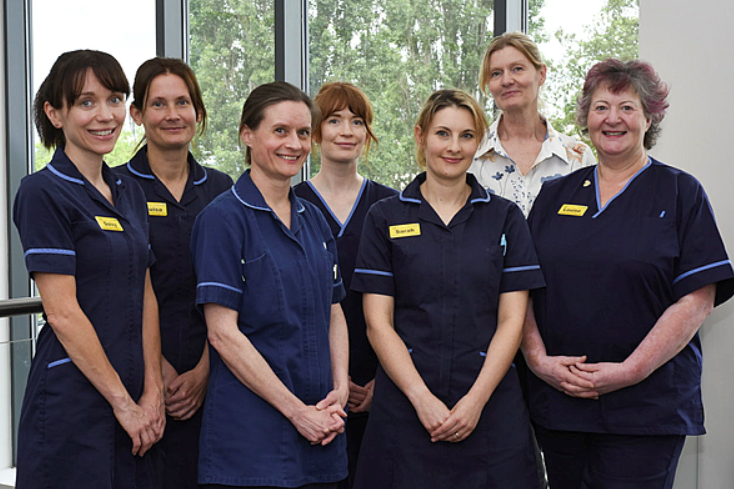Supporting Every Step: a closer look at our Skin Cancer Care Team
For many patients, a skin cancer diagnosis can be overwhelming. At Gloucestershire Hospitals, the specialist team behind skin cancer care fully understands this and provides support that extends far beyond the clinical aspects of treatment.
With a compassionate and personalised approach, the team is there from the moment of diagnosis through treatment, follow-up and recovery, often forming long-standing relationships with patients.
The eight-strong team, made up of 6 Skin Cancer Clinical Nurse Specialists (CNSs) and 2 Cancer Support Workers, offers continuity that is not always common in other cancer services. From routine checks to performing minor surgical treatment and delivering complex care plans, they remain a consistent and familiar presence.
“We support people from the very beginning of their journey,” explains Macmillan Skin Cancer CNS Louisa Hancox. “It’s not just about diagnosis and treatment. It’s about helping them understand their condition, prepare for the future and feel confident in looking after their skin.”
Meeting Growing Demand
The team sees around 6,000 patients each year. Among those, approximately 250 are newly diagnosed with melanoma, a more serious form of skin cancer. They also manage hundreds of cases involving squamous and basal cell carcinomas, alongside rarer forms such as Merkel cell and sebaceous carcinoma. Some patients have lifelong genetic conditions like Gorlin syndrome, which can result in hundreds or even thousands of skin lesions during a lifetime.
Although the demand for services continues to rise, the team’s focus remains unchanged: to provide calm, compassionate and individualised care to every patient they see.
A Nurse-led Approach to Personalised Care
Back in 2019, Louise Pound, who leads the Macmillan Skin Cancer Clinical Nurse Specialist team at Gloucestershire Hospitals, was a finalist for the Quality Improvement Excellence award at the Macmillan Excellence Awards.
Louise had identified that care for skin cancer patients could be more consistent and coordinated, so she took steps to redesign the pathway. She introduced a nurse-led triage and assessment clinic for individuals with suspected or confirmed malignant melanoma, alongside dedicated nurse-led appointments for delivering significant news. Her proactive and supportive approach played a key role in transforming the service and improving experiences for patients.
Louise’s compassionate leadership has empowered her colleagues to embrace these changes with confidence and the nurse-led model she pioneered is now viewed as best practice in skin cancer care.
Bridging the Emotional Gaps
For many people, the time between appointments or waiting for test results can be the most difficult. Feelings of uncertainty and worry are common, particularly for those living with health anxiety. This is where the team’s Cancer Support Workers, Caroline and Becki, play a vital role.
Our Cancer Support Workers are often the first point of contact for patients who just need someone to talk to or who have questions about what comes next. That kind of reassurance is as important as any treatment.
Louise Pound, Lead Macmillan Skin Cancer Clinical Nurse Specialist (CNS)
Adapting to a Changing Landscape
Over the past decade, advances in treatments such as immunotherapy and targeted therapies have changed the outlook for many people diagnosed with melanoma. While these options have improved survival, they can also come with long-term side effects, which the team continues to monitor and manage.
“It’s important to recognise that even when treatment goes well, there may still be physical or emotional challenges that follow,” says Macmillan Skin Cancer CNS Daisy Morgan. “We continue to support patients through those longer-term effects as well.”
Facing Myths and Misinformation
Despite growing awareness, harmful myths about sun safety remain widespread. The team regularly meets patients who have developed aggressive skin cancers after using sunbeds or following misinformation found online.
“There’s still a belief in things like the ‘base tan’ or homemade sun creams. Some people even avoid using sun protection on children due to unfounded fears,” says Abbie Mills, skin cancer CNS. “We try to approach these conversations with empathy, understanding that people are often just trying to do what they think is right.”
Working with the Wider Community
Education and prevention are also part of the team’s mission. They regularly engage with communities most at risk, such as farmers, construction workers and others who spend long hours outdoors.
“Some people are hesitant to come forward or have checks. It’s not always easy to change those habits, but we’re continuing to try,” says Louisa. “Having public figures who speak openly about their own experiences could make a real difference.”
A Long-Term Partnership
For many people under the team’s care, the relationship is not short term. Melanoma patients are usually followed for at least five years, while those who have had complex treatments may require monitoring for much longer.
The skin cancer care team at Gloucestershire Hospitals offers more than medical care – they provide a steady presence, informed guidance and unwavering support throughout every stage of the patient journey.
We build real connections with our patients. The best part of our job is them. Being part of their journey, seeing them through tough times and helping them come out the other side, is incredibly meaningful.
Lucy Daffarn, Macmillan Skin Cancer CNS
